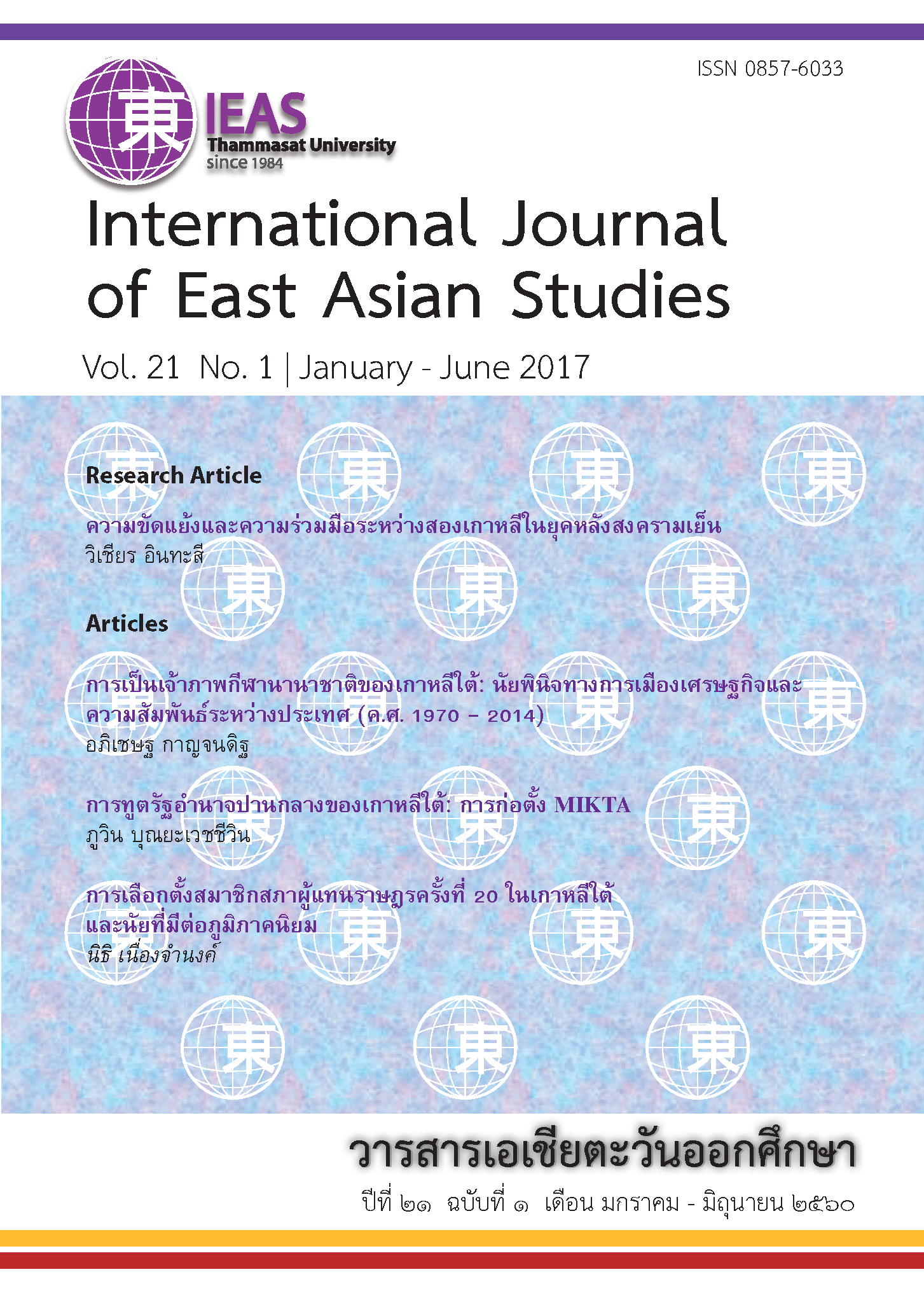การเป็นเจ้าภาพกีฬานานาชาติของเกาหลีใต้: นัยพินิจ ทางการเมืองเศรษฐกิจและความสัมพันธ์ระหว่างประเทศ (ค.ศ.1970 - 2014)
Abstract
An article titled “South Korea as a Host of International Sport Events: Political, Economic, and International Relations Aspects (1970-2014)” aims to understand South Korea, to be exacted, the roles of South Korea’s government, when it became a host country of many international sport events during 1970-2014 and considers its political, economic, and international relations contexts through historical approaches. This study found that the government hosted many international sport events such as ASIAN Games, Olympic, and FIFA World Cup. Being a host country does not relate only sports and sport management issues, it is also about other aspects i.e. politics, economics, and culture. The government successfully presented itself to worldwide audiences as a positive government as well as presented its economic potential. For example, during hosting Olympic in 1988, the government revived international relations and exhibited industrial and electronic goods made in South Korea. Another example is, in 2002 FIFA World Cup was a government’s stage showing Korean high-technology products to South Korean and foreign investors to assure its economic stability. Lastly, hosting ASIAN games in 2014, again, was a good chance for the South Korea’s government to show its contemporary cultural industries globally.
บทความเรื่อง “การเป็นเจ้าภาพกีฬานานาชาติของเกาหลีใต้: นัยพินิจทางการเมือง เศรษฐกิจและความสัมพันธ์ระหว่างประเทศ (ค.ศ. 1970 – 2014)” เป็นการศึกษาโดยใช้ระเบียบวิธีทางประวัติศาสตร์ โดยมีวัตถุประสงค์เพื่อทำความเข้าใจความเชื่อมโยงระหว่างการเป็นเจ้าภาพกีฬานานาชาติของเกาหลีใต้ กับบริบททางการเมือง เศรษฐกิจ และความสัมพันธ์ระหว่างประเทศ รวมถึงบทบาทของรัฐบาลเกาหลีใต้ในการเป็นเจ้าภาพกีฬาดังกล่าวตั้งแต่ ค.ศ. 1970 - 2014 การศึกษาพบว่าที่ผ่านมารัฐบาลเกาหลีใต้ได้รับสิทธิ์เป็นเจ้าภาพกีฬานานาชาติหลายครั้ง เช่น กีฬาเอเชี่ยนเกมส์ กีฬาโอลิมปิก และฟุตบอลโลก การเป็นเจ้าภาพกีฬาเหล่านี้มิเพียงแต่สะท้อนให้เห็นแต่เรื่องกีฬาและการจัดการการแข่งขันกีฬาเท่านั้น หากยังเชื่อมโยงให้เห็นความสัมพันธ์ระหว่างการกีฬากับบริบทและมิติอื่นๆ ทั้งทางการเมือง เศรษฐกิจ สังคมและวัฒนธรรม โดยเฉพาะการที่รัฐบาลเกาหลีใต้ใช้สถานะเจ้าภาพจัดแข่งขันเสนอภาพลักษณ์เชิงบวกด้านทางการเมือง และศักยภาพทางเศรษฐกิจของเกาหลีใต้ในยุคนั้นๆ สู่สายตาชาวโลกได้อย่างประสบความสำเร็จ อาทิ การใช้กีฬาโอลิมปิก ค.ศ. 1988 เพื่อฟื้นฟูความสัมพันธ์ระหว่างประเทศ รวมทั้งเพื่อแสดงสินค้าอุตสาหกรรมและอิเล็กทรอนิกส์ของเกาหลีใต้ การใช้เวทีฟุตบอลโลก ค.ศ. 2002 นำเสนอสินค้าเทคโนโลยีสารสนเทศที่ทันสมัยเพื่อสร้างความเชื่อมั่นทางเศรษฐกิจให้แก่ชาวเกาหลีใต้และนักลงทุนต่างชาติและใช้การเป็นเจ้าภาพกีฬาเอเชี่ยนเกมส์ที่อินชอน ค.ศ. 2014 เพื่อแสดงสินค้าวัฒนธรรมร่วมสมัยของเกาหลีใต้สู่สายตาชาวโลก



